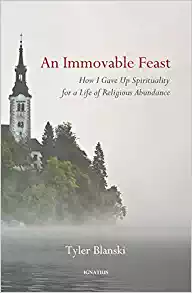
Tyler Blanski
Reviewed by: Everett A. Henes
An Immovable Feast: How I Gave Up Spirituality for a Life of Religious Abundance, by Tyler Blanski. Ignatius, 2018. Hardcover, 290 pages, $16.11. Reviewed by OP pastor Everett A. Henes.
This book will help you to understand why some convert to Roman Catholicism. It is written to convince the reader to convert as well. The author seeks to create a desire that he has come to believe only Rome can fulfill.
Over the past ten years, I have had the opportunity to work with college students, many of whom face what I’ve come to call “the Catholic Question.” The question is usually put this way: Why aren’t you a Roman Catholic? It often comes from their peers, though professors play a role as well. Behind it, is the assumption that the Roman Catholic Church is “original Christianity,” and if you do not align with them, you must justify your decision.
Tyler Blanski is a graduate from Hillsdale College. The topics he covers sound very familiar; almost like someone had taken all the conversations I’ve had with students over the past ten years living in Hillsdale and threaded them together. An Immovable Feast recounts Blanski’s college days, beginning as a Jesus-only evangelical. He walked the too familiar road, attending local Baptist churches, skipping church altogether, then visiting the local Anglican parish.
Blanski talks a lot about his relationships—friendships and romantic ties—that caused him to ask questions about the unity of the church and how he relates to students from other churches. The Hillsdale curriculum, focusing on the transcendentals of the good, the true, and the beautiful, gives him a sense of unity with his classmates that his faith seemed to lack.
Some students convert to Roman Catholicism while they are at college. Others do not. Blanski did not. But the seeds for conversion were sown there. The chapters that follow his college years are helpful, because he sets out to wrestle with key issues: sola scriptura, the place of Mary and the saints, the priesthood, the papacy, and “awesome” family planning. By the end, Blanski has converted, and he has drawn the reader along with him.
Absent from the book is any serious dealing with the theology behind these doctrines. Purgatory is taken for granted, and the treasury of merit is absent when discussing the saints. Mary comes to have a bigger and bigger place in his theology, joining the Father and the Son at the head table for this immovable feast he envisions.
As I finished the book I felt sad for Blanski. It sounds presumptuous, perhaps, but I was sad that I wasn’t there to talk with him during his college days. He asks good questions that have great answers in the history of the Reformed church. I could see him getting onto the sacramental treadmill that is the Roman Catholic Church. Get grace, lose grace, get grace, lose grace. One of his closing lines serves to show just how far he’d gone, “Perhaps we are saved not so much by ‘faith alone’ but by fidelity to Jesus and his Kingdom?” Blanski trades in assurance for a priest and justification by faith alone for a chance at purgatory, so long as he dies in friendship with God.
Blanski helps me to better understand the culture that leads to conversions. We must have good answers to questions about sola scriptura, the communion of the saints, the papacy, the place of Mary in redemptive history, and how to understand unity amidst the diversity in the visible church. Most of all, we must help people to understand that their only hope for salvation is through faith in Christ alone.
December 28, 2025
December 21, 2025
December 14, 2025
December 07, 2025
November 30, 2025
November 23, 2025
November 16, 2025
© 2026 The Orthodox Presbyterian Church